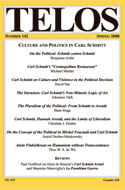By Matthias Küntzel · Thursday, April 17, 2008 Thursday is book day at Telos. We use this time and space for posts about books, authors, and all sorts of writing, considered in light of the sorts of questions that are at home at Telos. As with all our blogs, you are invited to post a comment. If you have a book review that you’d like to post here, or some other comment on the worlds of writing, drop a line to us at telospress@aol.com.
During a recent tour of the United States, Telos author, Matthias Küntzel delivered this speech in Bangor, Maine, under the auspices of the Jewish Community Relations Council and the Congregation Beth Abraham and at the Michael Klahr Holocaust Center of the University of Maine at Augusta on March 16 and 17, 2008. Küntzel’s Jihad and Jew Hatred is available from Telos Press.
Continue reading →
By Vernaccia · Wednesday, April 16, 2008 It is not an exaggeration to say that this past election marked a true revolution in Italian politics. The New York Times or The Economist will quickly dismiss it as the same old story with the same old TV tycoon, Silvio Berlusconi, who, for the third time, will serve as the Prime Minister of the Bel Paese. And they will be critical of this outcome, blaming it on Berlusconi’s subliminal abilities, as well as on the short-sighted Italians who voted for him. Blind as we are to the fact that he is rich, that he has a lot of power already, and that most of what he will do as Prime Minister will—so they claim in advance—border on conflict of interest. It is the same (alleged) conflict of interests, by the way, that the Left has been harshly criticizing for years without ever doing anything about it. They have preferred to keep things as they are in order to have what they deemed to be a powerful political weapon against Berlusconi. And they were wrong.
Continue reading →
By Russell A. Berman · Tuesday, April 15, 2008 One of the interesting features of the current China panic is how bits and pieces of the old anti-communist rhetoric is taken out of storage to be recycled, but this anti-communism is now used, strangely, against an increasingly capitalist China. For example, it is, on one level at least, the capitalist modernization of Tibet that has provoked some of the protesters, who maintain instead a romantic vision of a traditional society, unthreatened by railroads and commerce. On a deeper level, there are anxieties about the power of the Chinese economy, inexpensive goods, and American indebtedness.
Continue reading →
By Russell A. Berman · Saturday, April 12, 2008 The path of the Olympic torch brought out large demonstrations, especially in London, Paris, and San Francisco. Various political agenda were in play, most prominently objections to Chinese policies on Tibet and on the Sudan, with regard to the genocide in Darfur. Each of these topics could be discussed in detail, and it is surely not unreasonable to develop a criticism of China on these and other issues. China has problems, which it is fair to scrutinize. Yet the sudden eruption of anti-Chinese sentiment is striking. Something has changed.
Continue reading →
By Danilo Breschi · Wednesday, April 9, 2008 It is important to remember that Italy was probably the first country in Europe involved in that worldwide generational protest cycle which came to be called “1968.” The occupation of universities and the student mobilization had already begun in the autumn of 1967. In addition, the famous battle of “Valle Giulia” in Rome between students and police took place on March 1, 1968, before the most famous joli Mai.
Continue reading →
 In the 1987 Telos special issue devoted to Carl Schmitt, G. L. Ulmen and Paul Piccone asked “Why Schmitt? Why Now?”—attempting to respond to the outrage sparked by this journal’s serious engagement with a thinker associated with Nazi Germany. In the intervening two decades, the censorious resistance to Schmitt has not subsided, but the urgency of his ideas has dramatically increased. With the replacement of the Cold War by the War on Terror and the ICBM with the suicide bomber, game-theory calculations and the realism of missile counts have given way to efforts to understand the enemy. [1] Culture precedes politics, life precedes law, theology precedes order. Ergo Schmitt. In the 1987 Telos special issue devoted to Carl Schmitt, G. L. Ulmen and Paul Piccone asked “Why Schmitt? Why Now?”—attempting to respond to the outrage sparked by this journal’s serious engagement with a thinker associated with Nazi Germany. In the intervening two decades, the censorious resistance to Schmitt has not subsided, but the urgency of his ideas has dramatically increased. With the replacement of the Cold War by the War on Terror and the ICBM with the suicide bomber, game-theory calculations and the realism of missile counts have given way to efforts to understand the enemy. [1] Culture precedes politics, life precedes law, theology precedes order. Ergo Schmitt.
Continue reading →
|
|
 In the 1987 Telos
In the 1987 Telos 

